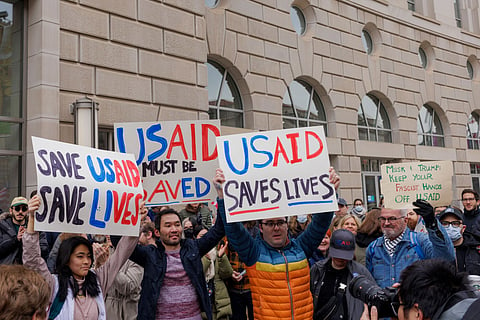USAID shutdown imperils humanitarian convoys in conflict zones
Convoys could be exposed to US military strikes after alert system is shut down

Washington: Humanitarian aid convoys could be exposed to US military strikes after a system designed to alert Pentagon authorities to their presence in war zones was shut down as part of the Trump administration’s move to close the US Agency for International Development.
The White House directed questions about the system’s shutdown to the State Department, which did not respond to requests for comment. The Defense Department also didn’t respond to requests.
Aid activity in Yemen
In a typical month, hundreds of notifications are passed on to the US military about aid activity in Yemen alone, one of the officials said. The formal system for handling this information was developed about a decade ago, after the US military began operations against Daesh (Islamic State), the terror group.
Even when the notification system is functioning, there is no guarantee that warring parties won’t strike hospitals, food warehouses or trucks carrying medicines and other essential supplies. In 2015, the top US general in Afghanistan confirmed that a US airstrike destroyed a hospital run by Doctors Without Borders, killing at least 22 people and injuring dozens more patients and staff.
In other conflicts, aid groups have come to distrust such notification systems over fears that some militaries simply disregard the warnings or use the alerts to target their operations. Those concerns emerged last year in Gaza, for example, after the aid organization World Central Kitchen notified Israeli forces about the route of their food aid convoy but were struck anyway, killing seven aid workers. The Israeli military said it thought it was targeting gunmen but later acknowledged the error.
Several aid groups working in conflict zones did not respond to requests for comment. Two organizations said they could not comment on the situation for fear of retaliation by the administration.
But current and former US officials have said that a well-run system can be a vital piece of making aid work safer “- and its absence puts humanitarian workers in danger.
“People who are in conflict zones know there’s a risk, but recklessly shutting down such an important mechanism doesn’t help any party that is involved,” said Michelle Strucke, a former deputy assistant secretary of defense for global partnerships who left in 2023. “It just recreates a black hole of information. It’s bad for the military. It’s bad for aid workers. And it’s bad for civilians.”



